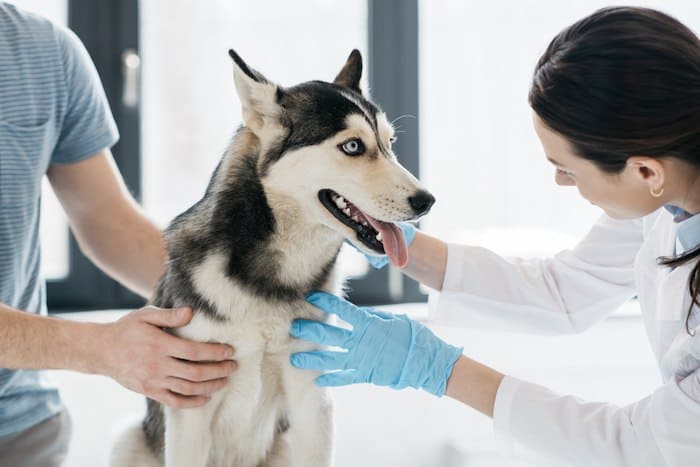Some dogs are not the most sensible when it comes to choosing what they put in their mouths. If your dog is particularly determined, it can seem almost impossible to stop them from eating things that they shouldn’t, no matter how hard you try. Sadly, it is common for foreign objects that are eaten to cause serious gut damage or even obstruction of the bowel.
Open your dog’s mouth and remove any plastic present.
Regardless of how much plastic your dog has already eaten, you don’t want him to swallow any more. Make sure that none of the plastic is stuck between his teeth or stuck to the roof of his mouth.
If you don’t feel comfortable or safe putting your hands in your dog’s mouth, just hop in the car and head over to the vet.
It’s important to ensure that your dog’s mouth is plastic-free, but you don’t want to complicate matters by getting your fingers nipped.
Contact your vet and explain what happened.
Now that you have determined that your dog isn’t in acute distress, and you’ve figured out what kind of plastic he’s eaten (as well as the quantity of plastic), you’ll want to call your vet.

Your vet will consider all of the relevant factors, determine the relative risk of serious problems, and recommend a prudent course of action.
Don’t have easy access to a vet? You may want to consider getting help from JustAnswer — a service that provides instant virtual-chat access to a certified vet online.
You can discuss the issue with them, and even share video or photos if need be. The online vet can help you determine what your next steps should be.
While talking with your own vet — who understands the ins and outs of your dog’s history — is probably ideal, JustAnswer is a good backup option.
If your 150-pound Newfie gobbled down a bit of a sandwich bag (and, presumably, the sandwich contained therein), but is running around like his normal goofball self and eating normally, your vet may simply recommend keeping an eye on him. Chances are, a small bit of thin, flexible plastic will pass right through his intestines without difficulty.
On the other hand, if your 12-pound wiener dog chewed up a DVD case, you may need to bring your pup in. The hard plastic may damage his esophagus, stomach, or intestines, and because he’s a small pup, he is more likely to suffer from an obstruction and be unable to eliminate the plastic he consumed.
My Dog Ate Plastic Because He Was Hungry?
Some dogs have seemingly bottomless appetites. They look for food everywhere they can find it! So, if you leave plastic food containers on the counter, full or empty, yiu can bet a hungry dog with a powerful sniffer will notice. Just ask anyone who has left last night’s takeout or a Tupperware container full of cookies out!
Dog shaming posts can be funny. Plus, some overly anxious or hungry dogs have a reason for seeking something to chew on. But, a dog ingesting a foreign object is definitely not a laughing matter! There are varied levels of health hazards possible if a dog swallowed a plastic toy or a dog swallowed plastic bags, for example.
FAQ
How long does it take for a dog to pass plastic?
Will my dog poop out plastic?